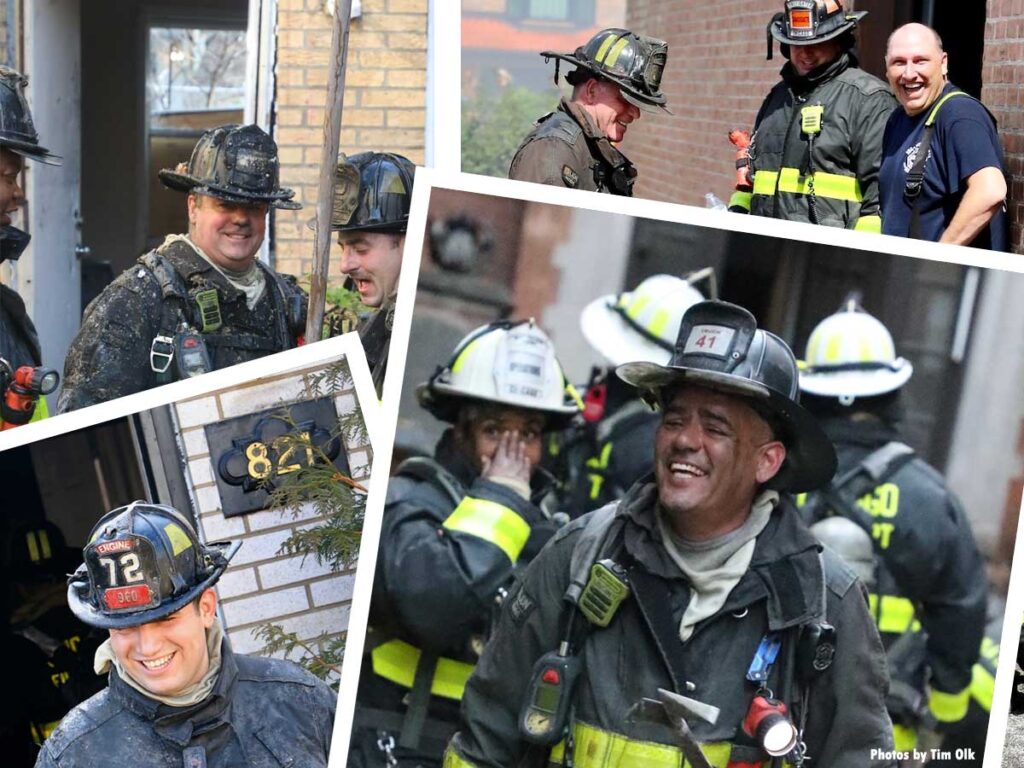
Walk into any firehouse these days and it’s always a gamble what the atmosphere may be. A silent crew around the kitchen table, a dayroom full of laughter, noses buried in their phones in silence on the bay sofas.
There’s a myriad of factors that have led us to shift away from camaraderie in the firehouse, but today we’re going to tackle just one: the loss of laughter.
- The Firehouse Kitchen Table: The Importance of the Morning Meeting
- Halton: Anti-Social Media vs. The Table
- Seven Trust Busters That Damage Your Team
Somewhere along the way we started to become afraid of joking. After watching a buddy or two get in trouble for a joke that someone took offense to, it’s kind of a no-brainer that some firefighters became wary of making jokes in mixed company. I wince every time a woman I don’t know walks into the kitchen and I feel the need to stop joking…and I’m a woman.
It’s become part of our culture that it is better not to joke around than to accidentally offend someone and get smacked by a stack of paperwork. Add in the mind-numbing online harassment training we must suffer through every year and it’s sometimes just easier to stay quiet.
It turns out the joke is on us. The U.S. Equal Employment Opportunity Commission (EEOC) came out with a report that admitted that firehouses might not have been so far off the mark with how we handle in-house problems in the first place.
A 2016 EEOC report stated that “Training Must Change. Much of the training done over the last 30 years has not worked as a prevention tool—it’s been too focused on simply avoiding legal liability. We believe effective training can reduce workplace harassment, and recognize that ineffective training can be unhelpful or even counterproductive. However, even effective training cannot occur in a vacuum—it must be part of a holistic culture of non-harassment that starts at the top. Similarly, one size does not fit all: Training is most effective when tailored to the specific workforce and workplace, and to different cohorts of employees. Finally, when trained correctly, middle-managers and first-line supervisors in particular can be an employer’s most valuable resource in preventing and stopping harassment.”
Multiple studies have shown that the most effective way to handle problems is at the lowest level, that is, the kitchen table. When we create an environment where we can call out someone for going too far or have the space to apologize for a joke that landed wrong, we create a culture that’s more likely to not ostracize someone. It’s what we’ve often done, and somewhere along the way we became afraid of it. As it turns out, research says it’s still the best way.
An article titled “30 years of harassment training hasn’t fixed a thing. Here’s what leaders should do instead” points out: “When there’s a lack of inclusion, that means there are weak social connections between employees, creating more potential for employee misunderstandings and conflict. The weak social connections also mean there’s less tolerance in the face of misunderstandings and a propensity to assume bad intent rather than just think of a situation as a simple misunderstanding.”
Translation: weak social connections make us more likely to be offended by one another. So how do we build strong social connections? Well, one place to start is the kitchen table. Laughter is a key tool in social bonding between people, and it also allows people to feel safe in their environment.
Joking at the kitchen table isn’t just a fun thing to do. It brings down the levels of stress hormones in your body and helps to bring down your “fight or flight” response. Sophie Scott, director of the Institute of Cognitive Neuroscience at University College London, told CNBC in an interview that laughter also helps to reduce the level of adrenaline and cortisol in the body, which are known as the anxiety and stress hormones.
“You get an increased uptake of endorphins when you’ve been laughing and those are the body’s natural painkillers,” she added.
Importantly, Scott said, humans seem to use endorphins as a bonding mechanism. She explained that people tend to do things that are associated with the release of endorphins, like laughing, with other people, so these activities are actually “reinforcing your sense of being affiliated with those people.”
At the end of the day laughter is an essential tool for our health and bonding capabilities. Don’t take my word for it: science said so.
We’ve also been training people how to handle harassment incorrectly for the past 30 years and have instead been ostracizing people. Bring laughter back to the firehouse. Bring back a model of training that involves handling problems at the lowest level when possible instead of shooting any offense off to the highest level. Allow people to apologize for their mistakes. If we truly take accountability for the atmosphere in our own firehouse we create a space where people can live—and laugh—for 24+ hours.
REFERENCES
https://www.eeoc.gov/sites/default/files/migrated_files/eeoc/task_force/harassment/report.pdf
https://www.cnbc.com/amp/2021/07/08/why-laughter-can-make-you-more-productive-at-work.html
Stephanie White is a 19-year veteran of the fire service, and has spent the past 17 years as a professional firefighter/paramedic in a metropolitan fire department. Throughout her career, she has been actively involved in firefighter health and safety as a personal trainer, cancer awareness educator, and a trained mental health peer.
More Stephanie White
- Suicide Safety Plans for the Fire Service
- Firefighter Suicide: Don’t Normalize It
- The Post-Shift Ritual: Creating Your De-escalation Routine
- Commentary: Getting Along with Females in the Firehouse
This commentary reflects the opinion of the author and does not necessarily reflect the opinions of Fire Engineering. It has not undergone Fire Engineering‘s peer-review process.

